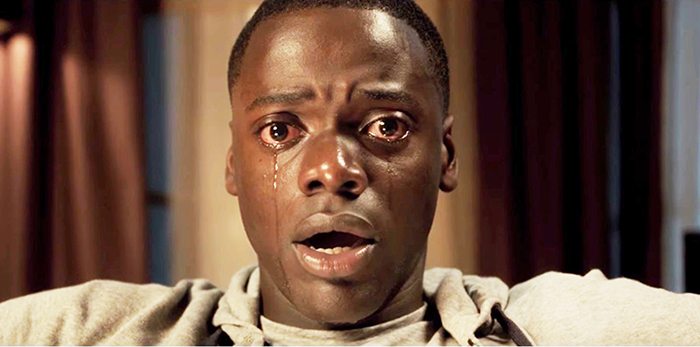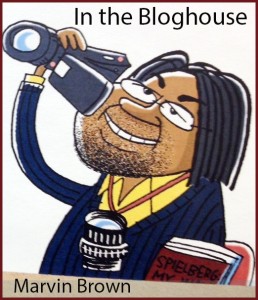Get Out (2017)
Rated R

Blumhouse Productions
Get Out has the suspense, creepiness, violence and jumps scares one would want from a good horror film. Written and directed by Jordan Peele (half of the “Key & Peele” sketch comedy duo), the film’s also insidious with its coiling use of racial themes to enhance its effect.
A chilling opening sequence evokes the Trayvon Martin tragedy as we watch a young black man walking lost in the suburbs at nightfall. Peele immediately establishes a knack for tone and subtext. A character walking alone in the dark is a horror film trope, but certainly the specificity of a lone black man in a white neighborhood adds another dimension of dread to the scene. Notice, in quick, quiet cellphone dialogue, that the man knows how he looks and where he’s at invites danger.
 Next, we’re introduced to engaging interracial couple Chris and Rose (Daniel Kaluuya, “Black Mirror,” and Allison Williams, “Girls”) preparing for a weekend trip to Rose’s parent’s palatial estate deep in the exurbs. Rose seems nonplused that her mom and dad are unaware Chris is black; Chris is obviously more concerned about the oversight. Peele plays with racial notions of Rose’s privilege vs. Chris’ realistic concerns here, and in a later scene on the road when they are visited by a police officer. Rose doesn’t hesitate to cut into the officer for what she perceives is racist treatment of Chris, while Chris simply wants to deescalate a situation he’s likely experienced on more than an occasion. The opening sequence, police encounter and an accident en route cleverly set the viewer on edge even before the anticipated visit with the parents.
Next, we’re introduced to engaging interracial couple Chris and Rose (Daniel Kaluuya, “Black Mirror,” and Allison Williams, “Girls”) preparing for a weekend trip to Rose’s parent’s palatial estate deep in the exurbs. Rose seems nonplused that her mom and dad are unaware Chris is black; Chris is obviously more concerned about the oversight. Peele plays with racial notions of Rose’s privilege vs. Chris’ realistic concerns here, and in a later scene on the road when they are visited by a police officer. Rose doesn’t hesitate to cut into the officer for what she perceives is racist treatment of Chris, while Chris simply wants to deescalate a situation he’s likely experienced on more than an occasion. The opening sequence, police encounter and an accident en route cleverly set the viewer on edge even before the anticipated visit with the parents.
Said parents (Bradley Whitford and Catherine Keener) are welcoming in their liberal righteousness. Rose’s father, a successful neurosurgeon, declares he’d vote for Barack Obama for a third term if he could. Her hypnotherapist mother says all the right things but they land with a disingenuousness not lost on Chris. And what to make of Rose’s brother (Caleb Landry Jones, Antiviral), a disheveled rich kid quaking uneasily, speaking inappropriately, like he’s always on the verge of blurting out spoilers?
Back home, Chris’ best friend Rod (LilRel Howery), a TSA officer, is a Greek chorus of sorts, humorously braying about Chris’ naivety of race relations. But Chris—and the audience—isn’t naïve, simply hopeful for the best while laughing at Rod’s over-the-top rantings. You see, Rod says all the things black movie-goers say about white horror movies. He can smell a setup a mile away. Peele, working so effectively as a director of horror, here reminds us he made his bones in comedy.
Over the course of the weekend, Peele quietly but assuredly reels the viewer into a delicious web of paranoia. Suddenly, there’s an annual gathering of friends and family. The winding driveway his lined with black, expensive SUVs, the expansive lawn is a sea of gawking white faces. Chris’ and our time in exurbia grows curiouser and curiouser. His solo trips around the huge house and vast grounds bring unease. The way he’s regarded and how he reacts as the lone black man amongst throngs of old-money white people is a master’s class on how black folks navigate—sometimes moment to moment—competing worlds of racial divide. Chris’ intriguing hypnosis session with Rose’s mom—fantastically visualized as Chris floating in the cosmos with the real world hovering on a big screen TV just out of reach—sets the plot on a course not fully understood until the finale.
Most interesting is the portrayal of the other black faces Chris meets at the house. Every time he talks with or bumps into Stepford-like persons of color, Peele intrigues with the interactions—are they friends or foes, captives or themselves commanding some scheme? In this cauldron of supposed post-racial ennui, we nervously and giddily wait for the shoe to drop. Does Peele’s mixed-race heritage inform the proceedings? Perhaps. The film, in my view, knowingly winks at both sides of the racial coin. What an assured directorial debut!
If there’s a wobbly spot in an otherwise outstanding film, it’s a half-realized backstory concerning the death of Chris’ mother. The moment seems to exist mostly to justify an unlikely act of kindness late in the movie.
In the finale, with the curtains pulled back, the film burst with absurd conflict and straight-up horror and humor. The dangers are far afield from where we would have imagined, and yet with clever insight Peele suggests cultural appropriation is always hiding in plain sight.
This is the second “black” film in a row I’ve seen that, while presenting pointed issues on race, nevertheless with topical, effective storytelling and capable acting and directing taps into American commonality and manages to connect more broadly. Like Hidden Figures, this film seems to have admirers across the board.

| Marvin Brown’s Movie Review Archive
Social tagging: Allison Willams > bloghouse > Bradley Whitford > Catherine Keener > comedy > Daniel Kaluuya > horror > interracial > Jordan Peele > LilRel Howery > Marvin Brown > Movie > racial > review




